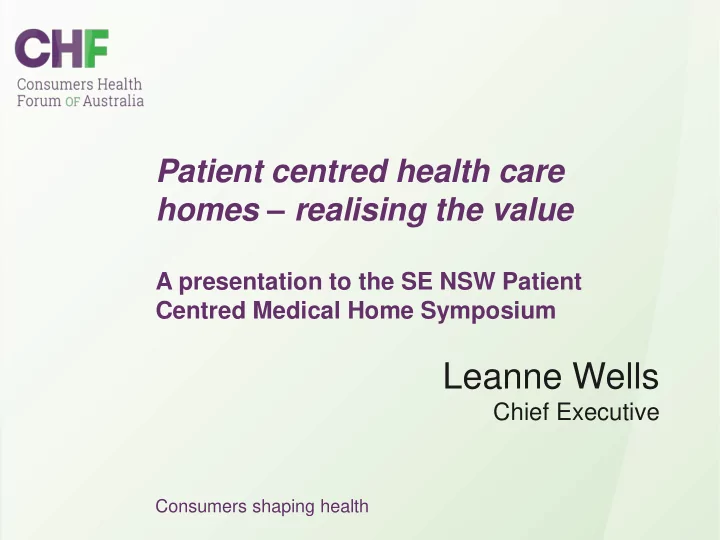

Patient centred health care homes – realising the value A presentation to the SE NSW Patient Centred Medical Home Symposium Leanne Wells Chief Executive Consumers shaping health
COORDINATED AND TRUST AND COMPREHENSIVE CARE RESPECT Linked care with good referral and ACCESSIBLE AND Provider asks about and feedback understands concerns AFFORDABLE CARE Integrated with supported Transparent transitions across the system Timely access to care based Accountable Availability of a range of services to on need Timely and effective multidisciplinary care Well organised, without complaint resolution process Complete personally controlled health organisational or systemic Shared responsibility and record barriers decision making Affordable for consumers Equitable access APPROPRIATE CARE PRINCIPLES OF Meet the needs and preferences of individuals CONSUMER – INFORMED DECISION Evidence based with consumers engaged in research MAKING CENTRED Treatment options, risks and Access to right information at right benefits identified time HEALTH CARE Safe and technically proficient with Information is clear and risks minimised understandable Practitioner engages with Costs are clear consumers, families and carers Personal choice and right to refuse to ensure understanding respected Informed and timely consent PLANNING AND WHOLE OF PERSON Consider carers and supporters GOVERNANCE CARE Partnership with consumers to Take account of consumers lives ensure sustainability and personal values Consumers involved at all levels Emotional of planning, system design and Physical service development Cultural, spiritual and social Consumers involved in key factors governance structures Consider carers and support Address risk factors and all health problems
Overview • Change drivers: mega trends • Primary health care matters • Patient experience • Health care homes: the grand design • The forgotten building blocks? • The activated consumer
Change drivers: mega trends Growing financial Increasing imperative to ageing and improve disease productivity prevalence Precision Digital health medicine and and the new personalised consumer care
Primary health care matters • Where we prevent and treat most • Efficient and accessible • God outcomes • System ‘gateway’ • Assists with pain points: transitional care • backbone of a strong health system • The potential of PHNs
Patient experience • Longer than acceptable wait time (19%) • Higher in rural and remote areas (20%) • Women reported longer wait times (23% v 18%) • GP did not spend enough time (24%) • GP did not listen carefully (28%) • Delayed filling a script due to cost (10% in areas of greatest disadvantage vs. 5% in areas of least disadvantage)
Patient experience • People seeing 3+ professionals for the same condition (16%) • Of those, 70% said a health professional coordinated their care • Health professional most likely to coordinate care = GP (61%) • 1 in 8 reported issues caused by lack of communication between professionals
Patient experience • Make life easier and more convenient for me • Let me take ownership and empower me • Include and respect me in the relationship • Keep me informed • Enable transparent access to my information • Give me the best care you can • Reduce my costs
Patient experience • A fragmented system and providers working in isolation not as a team • Uncoordinated care • Difficulty finding services • Service duplication, absent or delayed services • Low uptake of eHealth and other health technology • Access problems due to cost, transport, language, mobility and remoteness • Feelings of disempowerment
Patient experience ....”Patient activation, self -management, shared- decision making …all of these sound great in practice. I would be very happy to self-manage, if I could figure out how…. Patient activation sounds great on paper but what people often forget is that patients can only be activated in a system that enables it ….In my daydreams, the solution to all my problems is a highly organised ‘health PA’…..” Ceiwen Giles, Self -management? I need a PA!, BMJ Blogs, 10 November 2016
Let’s not forget health literacy
What matters most? • Feeling informed and being given options • Staff who listen and spend time • Being treated as a person, not a number • Involvement in care and asking questions • The value of support services • Efficient processes Robert G and Conrwell J (2011) What matters to patients? Policy Recommendations. Department of Health and NHS Institute for Innovation and Improvement
HCH: the grand design?
The forgotten building blocks? • Patient insights on practice redesign • Patient self-management & health literacy • Shared decision making • Workforce development and innovation • Social prescribing • The importance of transitional care plans
The activated consumer • Improves patient experience • Improves quality of care • Improves health outcomes • Reduces costs • Promotes positive health behaviours • Builds staff performance and morale Consumers shaping health
The activated consumer Makers and Shapers NOT Users and Choosers (Cornwall and Gaventa 2000)
Key messages • Primary care is important for patients • PCHCH a transformation whose time has come • Need to redefine consultations • More than medicine : non-clinical services important too • Activated patients can be agents of change • There’s a business case for ‘people powered’ health: it can help achieve quadruple aims • We need to invest in patient leaders in the same way we do clinical leaders
Key messages • Change is as much cultural as it is a new model of care – culture drives outcomes
Recommend
More recommend